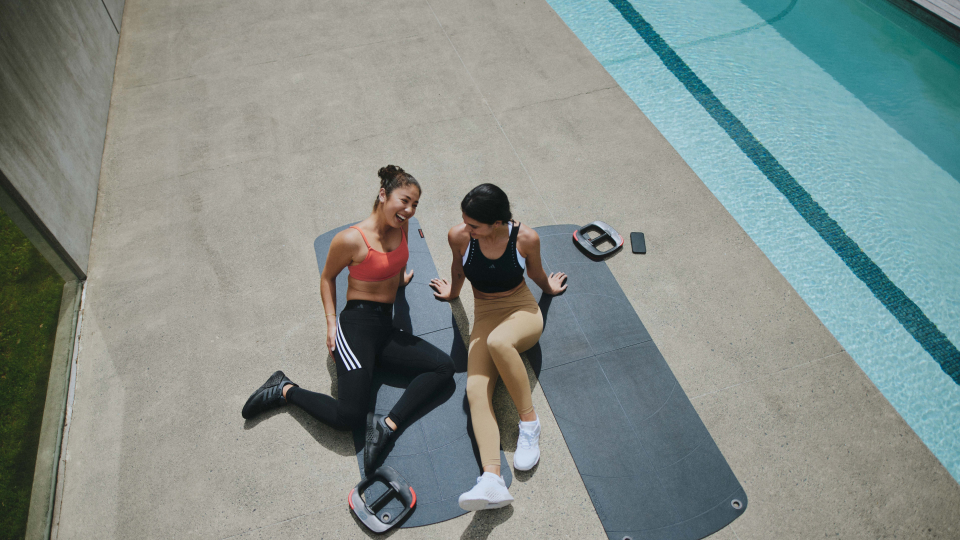Dr Alison Phillips is a professor of psychology at Iowa State University. She started her career working in a lab focusing on doctor and patient communication and how beliefs predict medication adherence. She quickly found that beliefs only go so far – habits are the key to making a behavior stick. Dr Phillips identified how bundling a new habit (like taking pills) with an existing habit (like making a morning coffee) can be fundamental to long-term success. Now, she’s exploring how a similar approach can help people embed healthy exercise habits.
Firstly, let’s be clear on what a habit is. Can you please explain?
Dr Phillips: “A habit in its true scientific context is an activity you are triggered to do automatically, without necessarily being consciously aware of what caused you to start doing that activity. Habits are so automatic that they happen whether you want them to or not. Like the route you drive to work each day – sometimes you end up at work without any real sense that you were paying attention while driving, and maybe you ‘forgot’ to make an additional stop to do an errand, because it wasn’t a part of your automatic (habitual) route to work.
Can exercise be a habit? Yes, it can, but it's not that clear-cut. You don’t do a workout without realizing you’re exercising – you’re always going to be aware you’re on a treadmill or at the gym. So technically a workout in its entirety is not a habit. But there are habitual parts to exercise, and by focusing on these habits associated with exercise you can get to the point where doing a workout feels automatic. Specifically, you can habitually instigate (decide it’s time for a workout at a regular time or at a regular point in your schedule), habitually prepare for (get everything ready that you will need for your workout ahead of time), and/or habitually execute (go through the same specific activities/motions for your workout) exercise.
I am interested in building on the concept of automatic habits and applying it to exercise and other complex health behaviors, such as diet change – making it easier for people to establish healthy habits that stick with them for their lifetime.”
Why are habits superior to other motivators?
“If you're relying on motivation like a specific goal to stick with a behavior, it will be problematic because goals change, motivation flags, and life gets in the way. This is why habits are so important: they become automatic and our default behavior and are very resistant to change, even if our external goals change.”

Where’s the best place to start when it comes to creating exercise habits?
“Our recent study tested a set of interventions designed to help people form habits, with the intervention strategies focusing on exercise preparation habits, exercise instigation habits, and/or exercise motivation. All groups got basic goal-setting advice. We found all of the interventions can help people form habits, but the one that worked best is starting a preparation habit.
So it’s not about focusing on the actual exercise, it’s more about getting your stuff together for exercise – and it may be as simple as packing your gym bag before you go to bed.
However, although the study showed preparation habits seemed to work the best, my speculation is that people will do best when they choose the type of habit-forming strategy they think will work best for them. We know from psychology research that autonomy (that’s the ability to choose for yourself) is both motivating and rewarding, and you're more likely to be successful when you have the freedom to choose what you want to do.”
“Whether you choose a LES MILLS class, a walk or a run, the idea is to just do something at a regular time in your daily (or subset of days) routine, get your heart rate going and feel something. Having a habit of preparing what you need for various workouts will help make the exercise itself a routine part of your day. Then, when it comes to doing the exercise, even if it’s just for a few minutes, that’s enough to get you going with building a habit. You can ramp things up later as your endurance builds, your strength builds, or as you have more time.”
Habits take time to form. What should you do in the first few weeks?
“Be consistent, choose something that's doable, and track your progress. With something like exercise, the rewards are not always available immediately. By tracking your progress, you reward yourself with feelings of satisfaction. You feel pleased with yourself, your self-confidence is increased, and it can help you form an identity around exercise – you can see yourself as someone who exercises regularly. Lots of people get rewards from doing exercise with other people, even if they don’t love the exercise itself at first, so consider involving a friend or joining a class, whether online or in person. You can also focus on shorter-term rewards; for example, you will start sleeping better right away, when you start exercising.”
“Even if it’s just for a few minutes, that’s enough to get you going with building a habit.”
What's the most common mistake people make?
“One of the biggest mistakes people make is that they choose a type of exercise that is too challenging rather than rewarding, so they feel punished rather than rewarded.”

So how can we make sure our new habits make us happy?
“It’s important to have realistic expectations and recognize that starting an exercise habit is hard. Nobody’s perfect, so try not to feel bad if you find it challenging. Research shows that if you get down on yourself, you’re less confident and less likely to try again. If we start with realistic expectations in the first instance, it will hopefully be a positive experience. Tell yourself it will take time, and it won’t necessarily be super rewarding at first. But it will get easier.”
When is the best time to start a new habit?
“In general, the best time to form a new habit or break an existing habit that you don't want anymore, is during a life transition or major context change. For example, when you move location or change jobs. Researchers have looked into this with active transport and getting people to walk or bike more, finding that when people moved location, the new context made it far easier to start an active transport habit because it was a fresh start and they didn't have to overcome the context cues that used to trigger their car habit.
So, if you’re going through a major life transition, it’s great to take advantage of that and use it to disrupt bad habits or form new ones. But for the rest of us, if we're living in the same places and working in the same jobs, we have to look for opportunities.
Too often people only change their behaviors once something bad happens – like they have a heart attack or stroke – and that prompts them to start exercising. We want to avoid that.
The New Year is a natural opportunity because we're all naturally motivated for a fresh start, so we have an excellent chance to start a new habit.”
So New Year Resolutions are a smart idea?
“I absolutely think that resolutions are important. Sure, most resolutions fail, but that just highlights the human struggle. On the positive side, data shows the more we try, the more we learn about ourselves, and we get better each time. Interestingly, people who are trying to quit smoking are more successful after three or four failed attempts, because people learn about themselves and work out what works and what doesn't work – and that is what contributes to their eventual success. So, even though it’s hard, setting resolutions can be very valuable. Taking advantage of the habit-forming intervention strategies we used in the study can help to make it easier.”
What’s your #1 piece of advice for starting smart with a fresh resolution?
“Habits are easy to enact once you have them, but they’re not easy to form. Establishing an exercise habit doesn’t come quick or easy – you have to do something long enough and consistently enough to form a habit. So to stick at it, a key part is finding and embracing activities we find rewarding.”

What’s next for research in this space?
“There is so much potential. Experts and authors tell us about different strategies that work for forming habits, but we have little to no information about for whom those strategies don’t work, or why they don’t work.
More broadly, we researchers should focus on behavior maintenance (sticking with a healthy behavior for the long term). I think habits are just a part of the picture and that the answer to long-term adherence to exercise is around exercise identity. Which has motivation and habit behind it. I would like to explore more about what helps people form an exercise identity and how their lives change when they feel exercise is an important part of who they are. Identity may help maintain exercise habits when contexts change or other sorts of barriers to exercise arise – if our habits are disrupted and they are part of our identity, we will be motivated to pick up those habits again, perhaps in a modified form (e.g., after injury).”
Dr. Alison Phillips is a social and health psychologist at Iowa State University. She has expertise in the areas of health-habit change and patient-provider communication and studies the processes by which individuals develop and maintain health-related habits, particularly medication adherence and regular physical activity.








